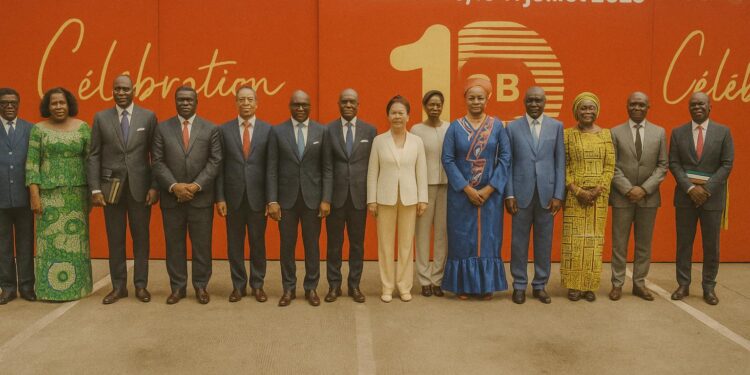Debt Conversion as Diplomatic Instrument
When the Republic of the Congo and France signed the Debt Reduction and Development Contract, known universally by its French acronym C2D, they embedded geopolitics into an accounting mechanism. The programme’s logic is straightforward yet strategically potent: bilateral debt service is recycled into local development projects agreed by both capitals. In the words of a senior official at Agence Française de Développement, the scheme “anchors partnership in results rather than rhetoric” (AFD 2023). Eight steering sessions later, the initiative has evolved into a laboratory for Franco-Congolese diplomatic synchrony, offering Brazzaville fiscal breathing space while allowing Paris to project development credibility in Central Africa.
Mapping the €229 Million Portfolio
The envelope of €229 million—approximately CFA 150.2 billion—has been distributed across thirteen projects and two capacity-building funds. Three flagships are already operational. The first phase of Brazzaville’s storm-water drainage mitigates seasonal flooding along the Djoué basin, a chronic urban vulnerability highlighted by the World Bank’s climate diagnostics (World Bank 2022). Concurrently, the social-worker training programme and the Lisungi cash-transfer scheme have fortified the human-capital pillar envisaged by the National Development Plan 2022-2026. Although two energy-sector interventions were abandoned, sectoral diversity remains intact: from the sinuous Corniche boulevard skirting the Congo River to the agricultural revitalisation under PARSA, each initiative is designed to align physical capital with social inclusion.
Social Safety Nets under Fiscal Pressure
The Brazzaville meeting placed social projects at the forefront, mirroring post-pandemic realities. Telema—aptly translated “Stand Up”—extends seed capital to vulnerable households, nurturing micro-enterprises in peri-urban districts where formal banking rarely ventures. According to the Ministry of Social Affairs, average household income among early beneficiaries rose by 18 percent within twelve months (Ministry report 2024). Finance Minister Christian Yoka framed the matter in systemic terms: social investment, he argued, “is as foundational as a bridge or a road; it cements societal cohesion essential for long-term macro-stability.” Such positioning resonates with regional economic-governance guidelines advanced by the African Union.
Inflation and the Re-Pricing of Development
Yet the macroeconomic canvas has shifted since the contract’s inception. Global supply-chain frictions and higher commodity prices have inflated construction costs, compressing C2D’s real purchasing power. French Ambassador Claire Bodonyi expressed concern that “some allocations no longer match the scope initially agreed,” while reaffirming Paris’s readiness to recalibrate envelopes in concert with other donors. The committee therefore recommended a granular cost review ahead of the 2026 disbursement cycle, a proposal consistent with International Monetary Fund guidance on performance-based budget adjustments (IMF 2024).
Governance Metrics and Digital Oversight
Beyond financing, the Steering Committee dwelt on monitoring architecture. Sectoral ministries will reinforce their tracking units, potentially through a digital dashboard inspired by Côte d’Ivoire’s SIGMAP platform, thereby enhancing transparency without encumbering line agencies. The two capacity-building funds—budgeted at CFA 6.3 billion—are earmarked precisely for this administrative modernisation. Early pilots show that digital procurement audits can shorten payment cycles by 20 percent, a gain that resonates with the President’s broader public-finance reforms announced in 2023.
Strategic Horizon beyond 2027
Looking forward, the six projects scheduled for closure between 2025 and 2027 will serve as an empirical stress test. Successful delivery could justify a third-generation C2D, echoing precedents in Cameroon and Côte d’Ivoire where successive contracts deepened sectoral reach (AFD comparative study 2022). For Congo-Brazzaville, such continuity would dovetail with its aspiration to graduate from lower-middle-income status while safeguarding debt sustainability under the CEMAC convergence framework. Diplomats privately note that stable political stewardship in Brazzaville remains an asset, offering predictability that development finance institutions prize.
A Calculated Symbiosis
The eighth committee did not produce fireworks; rather, it illustrated the quiet pragmatism that often underpins enduring alliances. By treating debt not as a liability but as catalytic capital, both governments signal confidence in collaborative statecraft. The coming months will test their ability to adjust budgets to inflationary winds while keeping an unwavering focus on poverty reduction. For now, the ledger records more accomplishments than setbacks, and the diplomatic calendar moves on, fortified by a shared conviction that equitable growth is the surest guarantor of bilateral amity.












































